
Emergency Dentistry – Falls City, NE
Get Fast, Pain-Relieving Care
If you are currently in the middle of a dental emergency, stop whatever you are doing and give Kobza Dental a call right away. We’re ready and able to handle a wide variety of dental emergencies, and we’ll do our best to see you the same day that you call in. Basically, our goal is to make sure no one is left waiting while they are in pain. Should the unexpected ever happen to you or a loved one’s smile, just remember, don’t panic, call Dr. Kobza!

Why Choose Kobza Dental for Emergency Dentistry?
- Same-Day Dental Crowns Available
- Affordable In-House Dental Savings Plan
- In-Network with Delta Dental & BCBS
How We Treat Dental Emergencies
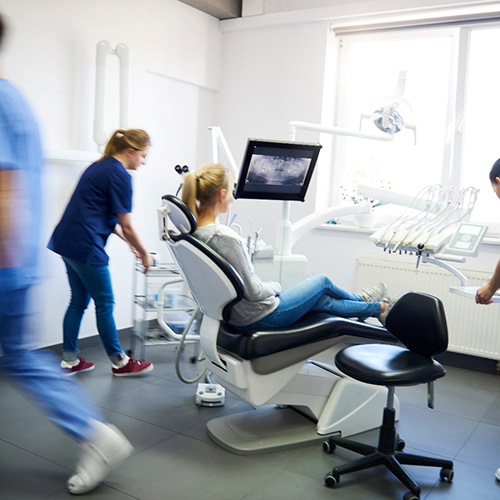
- Call Our Office: Whether you’re experiencing a toothache, just knocked-out a tooth, or a filling or crown has dislodged, call our office Our team at Kobza Dental tries to see all of our emergency patients as soon as possible to provide you with fast relief.
- Come In: When you arrive at our office, our team will jump into action examining your teeth and gums as well as capturing any necessary diagnostic images, like X-rays. Based on Dr. Kobza’s findings, he will diagnose the issue at-hand and develop a custom-tailored treatment plan to improve your oral health and comfort.
- Get Treated: Before you consent to moving forward with our recommended treatment, we’ll be sure to answer any questions or concerns you may have. Once you feel comfortable moving forward, we’ll jump into action to restore the health and look of your smile!
The Most Common Dental Emergencies
If you ever experience any out-of-the-ordinary oral symptoms or discomfort, even if you aren’t completely sure whether it requires urgent treatment, we recommend calling our office. Our team does everything we can to fit you into our schedule as soon as possible so you don’t have to wait in pain for any longer than absolutely necessary. Below, we’ve also included a list of some of the most common situations we see.
TMJ Treatment
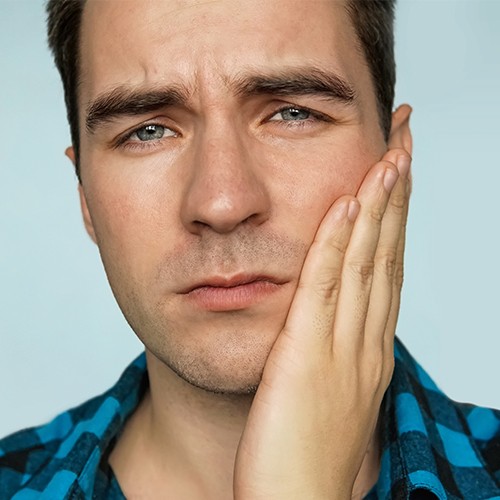
Do you have a stiff, painful jaw that pops and clicks all the time? Do you constantly have headaches and can’t figure out why? Does chronic neck, shoulder, and back pain bother you every day? Surprisingly, all of these symptoms and more can actually be caused by a strained or injured jaw joint, or TMJ. Dr. Kobza is specially trained to handle this aspect of oral health that often gets overlooked, so if any of these issues sound familiar to you, be sure to contact our office today to get the relief you need.
Understanding the Cost of Emergency Dentistry

Every dental emergency is different, which is why there’s no set price for treatment. Before we can determine what procedure will provide you with long-term relief and improve your oral health, we’ll need to diagnose the issue by conducting a thorough examination. Once we do this, we’ll walk you through your treatment options and make sure that you understand the pricing for each. If you have any questions about dental insurance coverage or you’d like to enroll in our in-house savings plan, don’t hesitate to ask!
Why Every Dental Emergency is Different
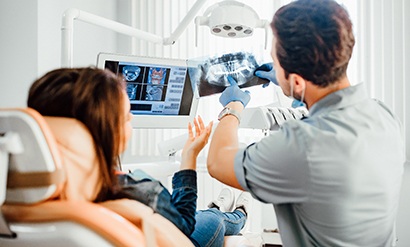
Patients are often surprised to hear that there isn’t a flat fee for emergency dentistry. The reality is that it varies because each treatment varies! While one patient might visit us because a restoration fell out, the next might schedule an exam because their gums are bleeding. Furthermore, even patients with the same symptoms may need different treatments. After all, a persistent toothache can be alleviated in more than one way. The good news is that – no matter the reason for your visit – we will provide you with an estimate of the price before getting started on your treatment to avoid unwanted surprises.
Does Dental Insurance Cover Dental Emergencies?

From the emergency exam to the necessary restorative care, it’s possible that your dental insurance provider will cover a portion of the cost. Since we welcome benefits from many of the nation’s top carriers, including Delta Dental and BlueCross BlueShield, we can help you if you are unsure how to maximize your benefits. In fact, we can even explain your coverage, provide you with an estimate of your out-of-pocket expenses, and file the claims for you. In short, we’re here to help, so don’t hesitate to ask!
Other Options for Making Dental Emergencies Affordable

Patients who are currently uninsured should consider joining our in-house savings plan. After paying the annual fee, you get access to immediate benefits, including an emergency exam. Of course, we also offer our patients other financial solutions, including flexible financing and periodic specials. With CareCredit, you can space out your payments into smaller, more budget-friendly chunks. With our periotic specials, you can save on everything from your first visit to your Invisalign consultation.
Taking Care Of Your Smile Can Save You Money

We always remind our patients to implement good oral hygiene best practices, like flossing each evening. What they often don’t realize is that these habits will also help them save money on emergency dentistry! After all, you’re much less likely to knock out a tooth while playing sports if you’re wearing a mouthguard, and you’re much less likely to sustain a serious fracture if you don’t use your teeth as tools. As always, if you need any tips on how to protect your smile or you simply need a refresher on how to brush and floss properly, you can always give us a call!
Keys to Preventing Dental Emergencies
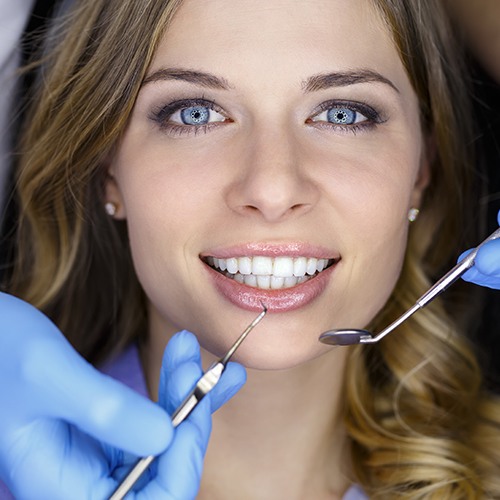
Even though it’s impossible to completely prevent a dental emergency from occurring, there are several ways you can drastically reduce your risk of experiencing one. Here are some ways to ensure the health of your smile:
Visit Your Dentist Biannually

Basically, you need to visit our team at Kobza Dental every six months to keep your teeth and gums healthy. Otherwise, tooth decay, gum disease, and other serious oral health issues can develop, resulting in considerable discomfort and difficulty chewing. In other words, if you want to significantly reduce your chances of experiencing a dental injury, you need to implement a solid at-home oral hygiene regimen and visit us twice a year for a checkup and cleaning.
Maintain Good Oral Hygiene At Home

As we mentioned above, maintaining a good oral hygiene regimen at home is key. First, make sure you have everything you need, like a soft-bristled toothbrush and antimicrobial mouthwash. Second, set a routine and stick to it, like brushing each morning before work and brushing, flossing, and rinsing with mouthwash after dinner. Third, make sure that you keep in mind proper timing, including brushing your teeth for a full two minutes each time.
Eat a Well-Balanced Diet

First, let’s talk about the things you shouldn’t do, like over-consuming foods and drinks with added sugar in excess. We also recommend exercising caution with extremely crunchy and sticky foods since they can chip a tooth or pull a restoration out of place. As for what you should do, we recommend filling your plate with smile-friendly foods, like raw vegetables, fresh fruits, and lean proteins, to help keep your teeth and gums healthy.
Wear a Mouthguard
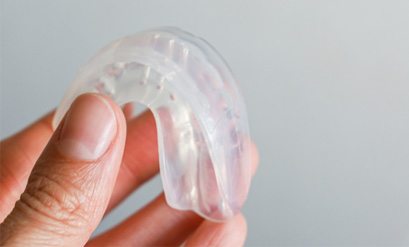
If you play sports – even a non-contact one – you should wear a mouthguard during practices and games. Otherwise, you could end up accidentally fracturing, cracking, or knocking out a tooth! We also encourage patients to wear a mouthguard if they chronically grind or clench their teeth. That way, we can help prevent premature wear as well as serious dental damage, like a significant chip.
Use Tools to Open Packages, Not Your Teeth
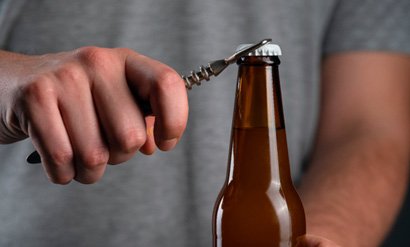
Although your teeth are sharp, they shouldn’t be used to remove clothing tags, bottle caps, packaging, etc. After all, using your teeth as tools is one of the easiest ways to damage them! For the same reason, we recommend breaking bad oral habits like using tobacco products, biting your nails, and chewing on ice.
Dental Emergency FAQs

Dental emergencies can be shocking because they happen out of nowhere. While dental emergencies are a fairly common occurrence, many people still have questions about them. At Kobza Dental, we want you to have the information that you need so you can stay healthy and safe in your day-to-day life. That’s why we’ve put together the answers to some of the most frequently asked questions about dental emergencies. Keep reading to learn more from your emergency dentist in Falls City.
What’s considered a dental emergency?
There are two different types of emergencies: infection typically caused by poor oral healthcare and sudden injury or trauma to your face. Dental emergencies are usually characterized by pain and swelling in or around your mouth. Any issue that needs treatment to alleviate pain, stop bleeding, or save a tooth would be categorized as an emergency. If you have discomfort that is affecting your routine activities, you have a problem that is worth a trip to our office as soon as possible.
When should I visit the ER and when should I visit the emergency dentist?
You should head straight to the emergency room if you experience trauma to the face or mouth, including:
- Jaw fractures
- Jaw dislocations
- An infection that is swollen or affecting your breathing
- Serious cuts or lacerations to your face or mouth
These situations are potentially life-threatening, which is why you should go to a hospital or call 911 immediately if any of these issues occur. For any other dental emergencies like a broken or cracked tooth, toothache, knocked-out tooth, loose crown or filling, and more, we are ready to help!
Should I go to the emergency dentist right away?
Unlike other medical conditions that will typically heal with time, dental problems will only get worse if left untreated. That’s why dental emergencies should be dealt with swiftly. We offer same-day treatment at Kobza Dental to give you the quality care that you need, right when you need it. If your dental emergency happens outside of our office hours, we still have a line that you can reach for helpful tips, but you should visit the ER right away. Typically, the longer that you wait to deal with a dental emergency, the more pain, swelling, or bleeding you may experience.
What does throbbing tooth pain mean?
A throbbing toothache could be the result of several things – from a significant crack to a severe infection. Regardless, the next step should be scheduling an exam with our Falls City emergency dentist. That way, Dr. Kobza can determine the root of the problem and the necessary treatment to restore your pain-free smile ASAP.
Will my toothache go away on its own?
No, toothaches don’t typically go away on their own. There are some cases where the infection can “kill” the nerve of the tooth, making it no longer able to register pain. However – as you may have guessed – that doesn’t make coming in for an appointment any less of a priority. In short, the best thing to do is contact us when your symptoms first arise. This will ensure we intervene with the restorative care early on, before more extensive treatments are needed.
My chipped tooth doesn’t hurt. Do I still need to visit?
If your chipped tooth doesn’t hurt, then a same-day visit to our Falls City dental office may not be necessary. With that said, you still need to schedule an appointment within a day or two so we can examine the tooth, checking if it’s at risk of developing an infection or breaking further in the process.
How should I sleep with tooth pain?
If you’re struggling with tooth pain, but your appointment with us is still a few days away, then you’ll be relieved to know that there are a few things you can do to get a good night’s sleep. That starts with your dinner, which should be free of spicy, acidic, crunchy, and sugary foods. Then, take an OTC pain reliever about 30 minutes before bed and prop yourself up on a few pillows when you go to sleep. This will help alleviate your discomfort and ensure your head stays elevated throughout the night.
Should knocked-out teeth be placed in water?
Although you can use clean water to gently rinse a knocked-out tooth, it cannot preserve the root surface cells of your teeth. That’s why patients are encouraged to either place the tooth back in its socket or submerge it in a clean container filled with milk instead.
What is causing my jaw pain?
Chronic teeth grinding, impacted wisdom teeth, and TMJ dysfunction are the three most common causes of jaw pain. When you come in for your exam, we will learn about the symptoms you’ve been experiencing, take X-rays, and look at your teeth to determine what the root of the problem is. Then, we will share our findings, review our treatment recommendations, and answer any questions you have before intervening with the necessary care.
I Need a Checkup & Cleaning I Have a Cavity or Broken Tooth I Want to Enhance My Smile I Want a Straighter Smile I am Missing One or More Teeth I Need a Dentist for My Child View Our Services